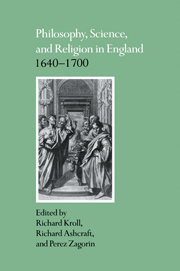Book contents
- Frontmatter
- Contents
- Notes on contributors
- Preface
- 1 Introduction
- Part I The Cambridge Platonists: philosophy at mid century
- 2 Henry More, the Kabbalah, and the Quakers
- 3 Edward Stillingfleet, Henry More, and the decline of Moses Atticus: a note on seventeenth-century Anglican apologetics
- 4 Latitudinarians, neoplatonists, and the ancient wisdom
- 5 Cudworth, More and the mechanical analogy
- 6 Cudworth and Hobbes on Is and Ought
- Part II The Restoration settlement
- Index
4 - Latitudinarians, neoplatonists, and the ancient wisdom
Published online by Cambridge University Press: 05 November 2011
- Frontmatter
- Contents
- Notes on contributors
- Preface
- 1 Introduction
- Part I The Cambridge Platonists: philosophy at mid century
- 2 Henry More, the Kabbalah, and the Quakers
- 3 Edward Stillingfleet, Henry More, and the decline of Moses Atticus: a note on seventeenth-century Anglican apologetics
- 4 Latitudinarians, neoplatonists, and the ancient wisdom
- 5 Cudworth, More and the mechanical analogy
- 6 Cudworth and Hobbes on Is and Ought
- Part II The Restoration settlement
- Index
Summary
It took a long time in the England of rebellion and civil war for the still small voice of Anglican moderation to be heard. Even after the Restoration the violence of religious and political debate continued to obscure the call to reason and the growing desire for peace among protestants. Eventually, however, the cry was heard across the land and it was discovered that there had been there, all along, a doughty little band of scholars quietly but earnestly pleading the cause. “I can come into no Company of late”, wrote an Oxford friend to Simon Patrick in 1662, “but I find the chief Discourse to be about a certain new Sect of Men call'd Latitude-Men.” According to Patrick, who immediately returned one of the first and best descriptions of the movement, it had arisen at Cambridge in “opposition to that hide-bound, strait-laced Spirit that did then prevail.” The latitudinarians, he reported, desired to settle religion in a “virtuous mediocrity” between the puritans and the papists on the one hand and the skepticism and materialism of the atheists on the other. He emphasized their attempt to conciliate the claims of reason and revelation and their plea for toleration and the virtuous life above any ceremonial scruples. And he noticed their preference for the church fathers before any modern divines and for the platonists beyond any other philosophers.
It is the appeal of the “platonic“ philosophy, or rather one particular strand in that ancient tradition of thought, that I should like to consider here.
- Type
- Chapter
- Information
- Philosophy, Science, and Religion in England 1640–1700 , pp. 85 - 108Publisher: Cambridge University PressPrint publication year: 1992
- 7
- Cited by



